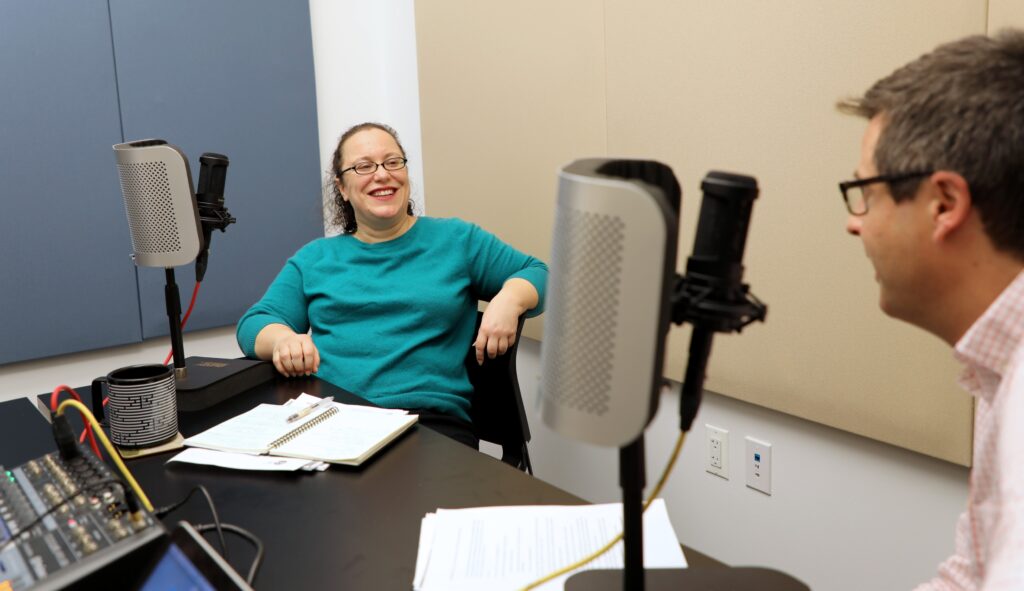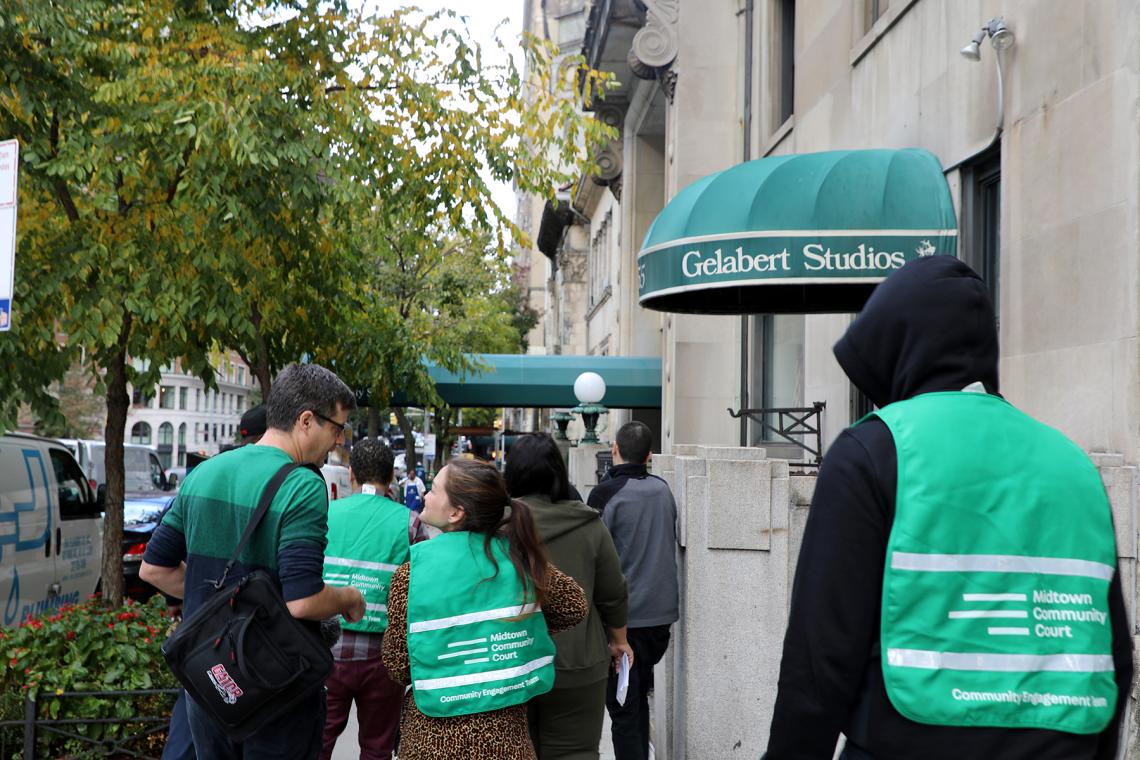
The community engagement crew of the Midtown Community Court
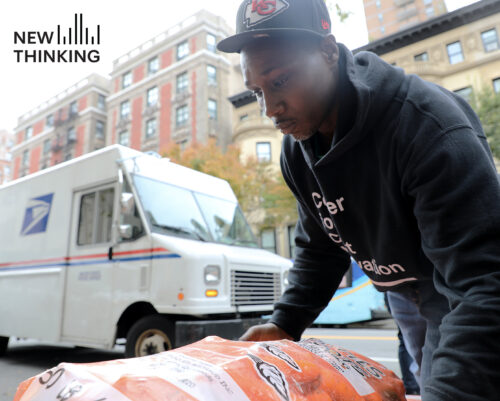
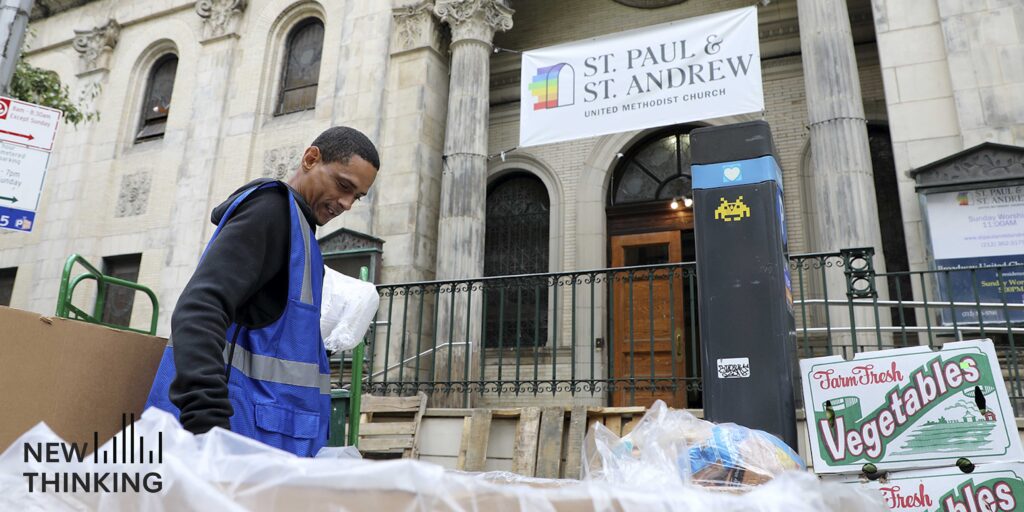
How do you do community work? It’s not a ‘how to,’ it’s a ‘desire to.’ This is about making connections.
Community service has been a staple of sentencing in the U.S. for more than 50 years. But how much do we know about how it’s actually being used by courts across the country?
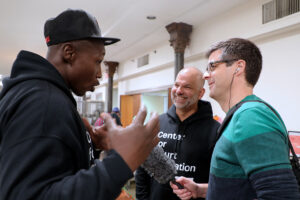
This episode of New Thinking is in two acts: in Act One, a snapshot of community service at the Center for Court Innovation. Host Matt Watkins follows along as a “community engagement” crew from our Midtown Community Court spends the day at a food pantry and community hub in Manhattan. And he talks with our own Harry Glenn and James Brodick about what community service can be, and the evolution of our own approach.
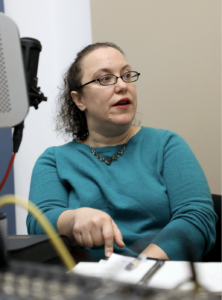
In Act Two, Watkins sits down with Joanna Weiss. As the co-director of the Fines and Fees Justice Center, Weiss chiefly wants to know about community service’s potential to function as an alternative to the use of fines and fees or short-term jail.
Two recent reports on community service—one from the Center for Court Innovation surveying courts across the country, and one from the UCLA Labor Center that takes a deep-dive on practices in L.A. County, the nation’s largest—raise troubling questions about the use and impact of community service sentences, especially on the poor and people of color.
Weiss and the two reports make a number of suggestions to improve community service—everything from shorter mandates to a wider array of work and job-training offerings to shift the current focus on manual labor.
As Weiss concludes, “community service has this sound of being restorative—that you’re serving your community. Unfortunately, what we find in the reality of many of the community service programs is that it’s not actually doing that.”
The following is an annotated transcript of the podcast:
SFX car horns, van door sliding shut
Welcome to New Thinking from the Center for Court Innovation. I’m Matt Watkins.
CLIP: Harry Glenn: “As you all already know, we’re going to the church today…”
It’s a Monday morning in Manhattan, a few blocks from Times Square. We’re in a van rattling its way uptown.
SFX van interior CLIP: Glenn: “Start our day off with a brief check in just to see how everyone’s feeling. If everyone‘s feeling good then I know we’re going to have a good day. I want the people to come in, feel good about doing the work that they’re doing, and at the end of it, hopefully they take something back with them.”
This is Harry Glenn, with our Midtown Community Court.
SFX van interior CLIP: Participant: “What’s your position title?” Glenn: “I’m like the renaissance man.” <<laughter>> My title here is the community engagement coordinator. And I actually like this, so, this is pretty much not like work because I talk to people every day. We help each other, because this is helping me at the same time too.
The work Harry is talking about is community service. In the van today is a handful of clients of Midtown Community Court. They’ve all received community service as their sentence after a low-level charge. Our destination is a bustling church uptown: we’ll be unloading food for a food pantry and helping to prepare meals.
Community service has been a part of sentences in the U.S for more than 50 years. But we don’t know much about how courts are actually using it. So, today’s show is in two parts: in the second half, we get a national perspective on community service—just how much of a real alternative sentence is it? But for now, let’s get back to our van and a snapshot of community service at the center for court innovation.
SFX van arriving, “we’re here!” Manhattan street, truck loading ramp lowering
We pull up to the church. A large truck out front is already being unloaded. There’s a box as tall as a 10-year-old kid overflowing with sweet potatoes, and shipping pallets stacked with 50-pound bags of carrots
SFX church interior
We head inside and down to the basement. The words “dignity community choice” are on large posters. There’s a lot going on down here. This is where you find the food pantry, clothing bank, and the kitchen where today’s lunch is being prepared. There’s even a free chef’s school. Folks wearing the green community engagement vests of Midtown Community Court are already threading through the crowd pushing large carts loaded with boxes of food.
Eventually, I manage to corral both Harry, and James Brodick. James is the director of community development and crime prevention at the Center for Court Innovation. He’s spent a lot of time thinking about what community service can be. The three of us are standing near the kitchen, just off to the side of a row of long steel tables. As we speak, the day’s lunch emerges in colorful stages. By the end, a long line of people is making its way from soup to dessert. Here are Harry and James. Harry speaks first.
GLENN: The people that we get for community service, for one, they’re doing it for themselves. First and foremost, they’re doing community service for themselves. Yes, they entered a contract as an alternative to incarceration, but when you’re doing community work, it’s something that you want to do. It’s something that you have to like it yourself to do it, in order for it to be effective. So when you ask that question, “Who is it for?” It’s for them, and it’s also for the organization that we work for.
And that’s why I’m very passionate about the work that I do because I feel it every day. My clients tell me what they need, and I use my toolbox of all the resources that we have here at CCI, and I feel around and see who can help me do what. Something as far as, “We need food stamps, Harry, where can I get them from?” I don’t have that answer. But I do know the social worker that will come and talk to them and give them the information that they need.
James BRODICK: I think in the beginning it was really about punishment. When people thought community service, they were thinking the old chain gang on the side of the highway. And I think what we wanted to do is say, “How can we hold people accountable but also think about how we can support communities?”
And the way we’ve done that is really strong partnerships. So when you get a good partner like a place like this, you’re able to not only connect people to solid services, but then I think what Harry and the team does is they talk about where they’re going in the morning, why we’re doing it. And I think the “why” has changed a lot. It really used to be about, “How do you get your seven hours?” Now it’s about, “How do you give back to the community you harmed while at the same time getting the people who are performing the community service a track to maybe think about future opportunities?”
GLENN: I try to give them whatever it is that I can give them to make them want to help themselves. Because that’s the thing here. You got to make them want to help themselves. And it’s kind of tricky on doing that because for one, they don’t want to be here. So I have to break that ice with them, let them know that it’s all right.
All right, we all make mistakes. And I use my own story because I’m sure that I probably did much more prison time than everybody that I work with. So I’m flexible with them, and I let them know how important it is, what they’re doing. I said, “I’m still doing community service every day. This is my form of giving back. I’ve done a lot of harm to the community, and I don’t dwell on that, but this is my way of giving back. So, if I can do it, you can do it.” I leave my life open to them.
BRODICK: When I watch you work, and I see the way you engage folks, you could tell it’s coming from a genuine place. And by the end of the day, you’ve given voice to folks who have gone through a system where their voice has been limited. From the point of arrest, you have the right to remain silent, and you don’t really talk much. In a courtroom, you’re encouraged not to speak up. So giving them this opportunity to say, “Hey, I’m not judging you for how you got here, but I am here to support you where you want to go.” I think that’s super powerful and everybody wants to feel valued.
And when I think about our most powerful community service, it’s at the end of the day, you go home saying, “You know, I feel like I did something good for the world.”
GLENN: Every time we finish any project, whether we’re at the hub just doing labeling, I let them know, “You work very fast.” I give them the good attributes about themselves so then when they walk out of here like James says, “Wow, he thought I could do a real good job at that.” And I do that because somebody did that for me.
Like I told you, this was not my plan. I didn’t come home and say, “I’m going to CCI to have a job.” No. It didn’t work like that. Somebody designed something and I followed it. I made myself vulnerable and that’s what I tell them too. In order to grow, sometimes you’ve got to make yourself vulnerable. And most of us that come from the background that I come from, we got this hard exterior. We don’t want nobody to help us.
So I know how to break that down and that’s what I do with the guys that I get. Because they share real things that they wouldn’t share with a social worker with me. They come and tell me, “I’m hungry.” And the language that we use in the street, as opposed to professional, is different. So, when they talking to somebody that’s professional, they’re not going to tell them that they’re hungry like that because they don’t want to feel embarrassed. But they’ll tell me straight up, “I need some food.”
I think me coming here changed the mindset of everybody that’s down here. Because a lot of the partners that we have, the first thing they say is that they don’t want people that’s been in trouble. And you know what I do? I tell them, I say, “Well look, I’ve been in trouble and you trust me with your organization. Now do you trust me to come down here and do the right thing?” “No, Harry you couldn’t have been in trouble.”
I keep this card in my pocket just so everybody’s on the same page. That’s my release card. So, when they say that I haven’t been in trouble, this is it right here. Look, I’ve been released this date and from this day on I’ve been doing the right thing.
WATKINS: A lot of people, wouldn’t keep that card in their wallet.
GLENN: I got to keep… This is a constant reminder of how serious things can get.
This is all the things that bring back the dignity to the people. See these words here that I like? “Dignity, community, and choice.” This is what happens in a ball of magic right here. Look, they’re preparing something very special.
BRODICK: It’s interesting, you know a lot of people around the country, they’ll come to the Center and say, “oh, how do you do community work?” And I often say, “It’s not a ‘how to,’ it’s a ‘desire to.’” It’s a wanting to be present, to be around people, and just being yourself. And I think so many times people just say, “What do we do? What boxes do we check?” This is not about checking boxes, this is about making connections.
When I watch Harry and think about how he came through and who he is today and how he’s moving the people that he works side by side with, how he’s able to get other people in the organization to want to partner and volunteer. And then when we think about the clients, how the clients look at him as a role model and somebody who is saying, “I care about you.” And they then follow up with continued programs and services.
And a lot of the work that we’ve learned in community service is that you want to make a long-term commitment to people and to place. And from there, what’s possible is endless. And we’ve seen it in many of our projects. And the greatest part of it is when somebody completes their mandate and is looking to come back and volunteer on their own, and it becomes part of their spirit, that’s when you know we’ve made the biggest impact.
So that’s really where community service has gone from the Center. It’s gone from a placement of investment, it’s gone from placement as fighting crime. And it’s also looked upon as partnerships—not only with a church like this, but also with the court system trusting us that when we bring a project to the forefront that they’re like, “That is a good idea. Let’s make it happen.” And so, people like Harry inspire me every day.
WATKINS: That was Harry Glenn, the community engagement coordinator at our Midtown Community Court, and James Brodick, the director of community development and crime prevention at the Center for Court Innovation.
STING music
WATKINS: And now that promised national perspective on community service. Joanna Weiss is the co-director of the Fines and Fees Justice Center. Before that, she worked for the philanthropy Arnold Ventures. While she was there, she helped to fund the research for two reports on community service that have just been published—one is from my colleagues here at the Center for Court Innovation, and one from the UCLA Labor Center. Both raise questions about how community service is being used in practice. I started the conversation by asking Joanna why she’d seen a need for this kind of research.
Joanna WEISS: I was leading a portfolio around fines and fees, and everywhere I turned, people were recommending—or using—community service as an alternative to fines and fees. But there was really no research to show whether or not that worked, and how community service was being used.
When I looked at the programs that I was exposed to, I was finding a lot of places were simply taking all the fines and fees you owed, and if you couldn’t afford to pay it, converting the bulk of it to hours based on minimum wage or something else, which I didn’t feel like was a very promising solution. And I suspect that there are other programs that are working much better. So I wanted to understand what did community service look like and is it a viable alternative to fines and fees.
WATKINS: So, what do we know now about the extent of community service? How much it is being used across the country?
WEISS: It looks like it’s being used a lot across the country. The report that CCI did shows that many, many courts are using community service, often as an alternative to fines and fees, sometimes as an alternative to jail. What the report and the research also suggest is, it’s often not a complete alternative.
People are still facing fines and fees and/or jail and then community service is often on top of that. So, it can act as an additional punishment in some places.
WATKINS: We know the criminal justice reform conversation nationally is shifting so much. There’s more and more jurisdictions that are, I think, going to be interested in trying to reduce their use of jail, maybe reduce their use of fines and fees. So, do you anticipate that more and more places are going to be reaching out to use community service?
WEISS: Yes. I think that, until we see the elimination of money in the justice system, and I don’t think we ever will for low-level violations—like traffic violations, fines are a reasonable punishment for behavior we don’t want.
The question is, what do we do about the fact that we have a substantial community in this country that can’t possibly pay the kinds of fines that are imposed? We live in a country where four in 10 Americans don’t have access to $400 in case of an emergency, which means even a low-level violation can really put somebody’s financial stability at risk.
WATKINS: So, what do we know about the characteristics of people who are being assigned community service and why they’re getting community service?
WEISS: So, it looks like, from the research that CCI has done and also the deeper dive that was done in L.A.–
WATKINS: The Center for Court Innovation is a national survey of courts, and then the UCLA one is really a deep dive into one particular county—L.A. County, the largest county in the country.
WEISS: Exactly. Both of those studies show that community service is being used a lot in two contexts in particular: it’s being used as an alternative to fines and fees or jail, in a misdemeanor and low-level violation context; and it’s being used a lot as an alternative to fines and fees in the traffic context.
WATKINS: That’s people who can’t afford their fines and fees, presumably, and are opting—or opting maybe is not the word, are forced to accept this. So generally, we’re talking then about lower-income people, which, as we know, is a lot of the justice system to begin with.
WEISS: Exactly. And particularly in the criminal context where we know that the vast majority of people who are justice-involved are also indigent, and also disproportionately from communities of color.
WATKINS: What kind of rules are governing the use of community service? We can’t talk about the nation as a whole since we know there’s 3000-plus counties, but even within systems, justice systems, what kind of rules are governing how community service is used?
WEISS: Remarkably few. There are a few places that have looked and tried to put in place some standards of what community service should look like: how we convert fines and fees, for example, into community service hours and putting a rate of conversion in place. Other places, I think, are doing a better job explaining what community service even looks like, and what constitutes community service.
Texas passed a bill a couple of years ago that explains that if you are converting to community service, it should be converted at a rate of $12.50 an hour, and that we should consider things like job training, and GED prep, and other kinds of factors that would address criminogenic factors as types of community service.
WATKINS: So converting, we mean people who end up with a court debt—and you’re the co-director of the Fines & Fees Justice Center, so you know better than anybody, how quickly fines and fees for even a very minor thing can balloon into a four-figure debt that people end up trapped under, and then they’re given the option of doing community service to quote-unquote pay off that debt, and their hours are converted. So say it’s minimum wage, you get 12.50 for each hour of community service that you do, but if someone owes $1,000, that’s going to lead to a huge community service mandate.
WEISS: It does. And in fact, what the UCLA study shows is that even a really low-level offense, a traffic offense, on average was being converted to 51 hours of community service.
WATKINS: Which is more than a week’s work.
WEISS: Right. That seems outrageous to me—that a low-level violation that if you have money, you simply pay, and you’ll probably not think about it a whole lot afterwards. But if you can’t pay, you’re assigned to more than a week’s worth of work, often doing manual labor and physically demanding labor. That does not seem like a proportionate sanction. And it’s particularly concerning because that’s an unproportionate sanction that’s really only doled out on poor people.
WATKINS: You mentioned manual labor: from the Center for Court Innovation study, that emerges as the most common form of community service used across the country. In the L.A. study as well, it’s working for the highway authority. So you’re cleaning up medians, you’re painting over graffiti. But what kind of problems does that pose that manual labor is the number one form of community service? It’s very physical labor.
WEISS: One big problem it poses is it means that this is not an alternative sanction that’s accessible to everyone. Both CCI’s study and the UCLA study show that, obviously, if you have a physical disability, then community service may not be an option for you. If you have a mental disability, or other constraint to doing that kind of work, it may not be available.
The other problem is that it’s simply, it really goes back to the proportionality. And when we think about what should be the punishment for a low-level offense, I don’t think most people would agree that a reasonable punishment, for somebody who’s poor, for a low-level offense or a traffic ticket should be 50 or more hours of hard labor.
WATKINS: Then it’s also difficult for people often to access these assignments, especially in jurisdictions with little public transportation—maybe your driver’s license is suspended because of fines and fees, so you can’t drive to your assignment. Maybe you also have a full-time job. Maybe you’re looking after an elderly parent or a child. There just seems like an immense number of obstacles.
WEISS: I don’t think that this is an acceptable or accessible sanction for most people. It should be some kind of small sanction that stops someone from doing it again, but it shouldn’t be something that disrupts the financial stability of someone’s life. It shouldn’t be something that interferes with your ability to earn a livelihood or take care of your family.
WATKINS: So, you have all these obstacles for some people in completing these often very long mandates. What do we know about how many people on average, I guess, or a sense, are failing to meet these requirements? And then what’s the range of ways in which systems are responding to so-called noncompliance?
WEISS: One of the problems is, if this is supposed to be an alternative to fines and fees, and we know we’re not supposed to jail people who can’t afford to pay, we also can’t be jailing people who don’t complete their community service hours, which are meant to be an alternative sanction. And in fact, what we’re seeing in both studies is that it’s a fairly common practice that there are bench warrants and even arrests and jails for people who aren’t completing their community service hours.
WATKINS: Meaning, in effect, that people are going to jail stemming from an original offense for which jail wouldn’t have been an option.
WEISS: Exactly. So we’re seeing that in some places, community service is used in a way that’s net-widening, and taking a low-level offense—like a traffic offense or a low-level misdemeanor that would never come with jail—and suddenly, because you’re poor, jail is on the table if you’re unable to complete this alternative sanction.
WATKINS: Something that emerged from the Center study was how few courts across the country, based on this sample of about 600 courts that responded to the survey, how few courts are running their own community service programs, which means that they then are obliged to work with outside providers.
Often, community service participants are made themselves, both sometimes to pay a fee for that, but also they have to contact and set up the arrangement themselves with the outside agencies, and it doesn’t sound like the courts themselves are doing a lot of oversight of what’s actually happening in these programs.
WEISS: Both those things are true. The first thing is, the fees. The idea that fines and fees, an alternative can be community service, how can we possibly be charging people, then, to participate in community service?
The very same people who can’t afford to pay their fines and fees instead are going to pay a fee, and sometimes they’re quite expensive, $50 or more. Sometimes there are fees that attach for every hour that you work in community service. That’s a massive problem and really serves as a barrier to community service serving as an alternative.
The other thing is, if courts simply outsource this and don’t take any responsibility, we really have no way of knowing then what kinds of programs are offered, and it’s how we end up with two problems. One, the massive number of hours being assigned to people doing manual labor, which as we already discussed, is a really problematic barrier and makes the punishment very disproportionate for people who are poor.
The second problem is that we’re building perverse incentives sometimes back into the system, because what’s happening is, community service is being used as an alternative to paid labor. What the UCLA study showed is that across L.A. County, there were 100,000 people assigned to community service. They were assigned a total of 8 million hours.
WATKINS: Over the year that they looked at.
WEISS: In one year, they were assigned 8 million hours. That’s the equivalent of more than 4,000 full-paying jobs, but it’s being replaced with community service employees who don’t have any labor protections, and don’t have any recourse if there’s harassment or abuse on the job site, if they get injured on the job site, any of those problems. And so, when the courts absolved themselves, it leaves people who are assigned community service, because they’re poor, with no recourse to deal with unconscionable labor practices.
WATKINS: The focus of the UCLA report is pretty stridently on community service functioning as often a kind of system of forced labor.
WEISS: And I will say Noah Zatz‘s expertise, who’s the author of the study, is really around labor issues and the cross-section between labor issues and criminal justice.
WATKINS: Why don’t we talk a little bit about some solutions now. For me, almost the biggest takeaway, from the Center for Court Innovation study anyway, is what you mentioned at the beginning: that we just need more research.
This is one national survey that got 600 or so lower-level courts to respond, but it’s the first of its kind to do this, even though community service has been a staple of sentencing for decades. So it just seems more research would be the first solution.
WEISS: Right now, we don’t have a model for what works as an alternative to fines and fees. So I do think there needs to be more research. Are people able to complete their sentences? Did people have the perception that this was a proportionate and fair punishment? Did it lead to reductions in recidivism? Were people less likely able to continue the behavior that we were trying to stop in the first place with the original sanction?
We also have to think differently about the kind of work that’s assigned. In the survey that CCI did, courts agree that this is supposed to give people a second chance, this is supposed to be a humane alternative. So we have to think differently about what’s available and what’s considered as community service. It should be things that actually serve the community or it should be ways of addressing criminogenic factors. So for example-
WATKINS: Criminogenic meaning things that might lead people to commit further offenses.
WEISS: Exactly. So I think there’s a program right now, at the Office of Administrative Trials and Hearings—OATH in New York City—where a low-level violation that was once heard in criminal court was decriminalized and now the sanction for that offense is just a fine.
WATKINS: That’s a program that actually we helped to set up initially.
WEISS: Yes. And it’s offenses such as drinking in public. So, drinking in public is a low-level violation, and if you can’t afford to pay the $100 fine, and I might add that there are no fees included in that fine. It’s just a base fine, which is what we would like to be seeing…
WATKINS: …across the country.
WEISS: …across the country. If you can’t finish it, you can take a one-hour video program course that teaches you about why you shouldn’t drink in public and the effect that that can have on your community. That’s the appropriate sanction as an alternative to $100 fine. This is a low-level violation. It’s being treated as a low-level violation in the monetary punishment. The community service alternative should be equivalent.
The other thing is we should think about the kinds of things like Texas is doing, which is considering job training, GED prep, or other education courses as part of community service, or allowing people to serve their community in ways that would be meaningful to their community, such as volunteering in their church or doing something else that doesn’t exploit them, doesn’t replace existing labor, and is much more in proportion to a monetary sanction.
WATKINS: A really blue-sky proposal, although I think it’s a recommendation at the end of the UCLA report, would be: if we’re going to have community service, we use it as potentially a kind of workforce development program?
WEISS: We know that the people who are entering the system on low-level offenses are very disproportionately poor. If we can do things like make it easier for people to get jobs and stay in jobs, they’re less likely to commit those low-level offenses that end them up in court to begin with. So, if community service can be seen as part of the root to addressing those kinds of factors and the problems that people face when they’re poor, we’re much less likely to see people back in court.
WATKINS: And then what about the issue of the front door of the system, often, low-level stuff becoming criminalized and bringing people in. One solution is narrowing that front door, so people aren’t being exposed to the fines, the fees, the community service.
WEISS: We have way too many people who are being charged. We have way too many poor people and especially, way too many people of color, who are being charged with low-level offenses as a revolving door and it has to do with how we enforce the law and where that enforcement happens. And because there is so much more policing in poor communities and communities of color, those are the people who are disproportionately having the burden of fines and fees and other sanctions, because that’s who’s getting charged.
We also have to look at the kinds of things that we’re criminalizing, and whether or not those should be criminalized at all. We have all sorts of sanctions for people who are living their life as homeless people. Those shouldn’t be sanctions. Those shouldn’t come with fines and fees or an alternative sanction.
WATKINS: And in what world is a homeless person going to be able to afford a bunch of fines and fees?
WEISS: They’re never going to be able to, and I use homeless people as an example because clearly, homeless people can’t possibly pay fines and fees. But also, it speaks to the kinds of behaviors that we criminalize. If you are homeless and you don’t have an alternative to sleeping on the street, or urinating on the street, or loitering, or all sorts of other offenses that are commonly imposed on people, because they’re living on the street—if we could remove those, that would be the first step to shrinking the criminal justice system.
And one of the other problems is, that we are relying on our courts in many places as a way of generating revenue. That’s part of the reason that there’s this constant incentive for more and more enforcement because this is how places are balancing their budgets.
WATKINS: That’s what came out of the Ferguson report by the Department of Justice—that system was exposed.
WEISS: What was going on in Ferguson is that more than 20 percent of the total budget for the city of Ferguson was coming through fines and fees. Then when people couldn’t pay, there were licenses suspended and there were warrants for people’s arrest, because they didn’t pay or they missed a hearing date. And you ended up in a situation where there were more warrants than there were people in the city of Ferguson. What we’ve learned since Ferguson is that this is a practice going on all over the country.
WATKINS: Community service has this very sunny, uninterrogated reputation, in many ways. Both these reports chip away at that image and suggest that there’s a lot of thinking and practical changes on the ground that need to happen.
WEISS: I think that the perception is that certainly, assigning someone community service—which even by its name sounds pleasant, you’re serving your community. That seems–
WATKINS: Something the Kiwanis and the Boy Scouts do.
WEISS: Exactly, and it has this sound of being restorative, that you’re serving your community and it’s a way of making you accountable to your community. Unfortunately, what we find in the reality of many of the community service programs is that it’s not actually doing that, that people are not simply being assigned to serve their community or restore harms to their community.
Instead, they’re being given a more onerous punishment that’s setting people up to fail, and we’re also giving that onerous punishment only to people who are poor, very disproportionately to people of color. So, it doesn’t actually have that sunny restorative solution that we’re looking at in many of the ways that we use community service today across the country.
WATKINS: That was Joanna Weiss. She is the co-director of the Fines and Fees Justice Center. For links to both of the reports we were talking about, and photos from today’s episode, click the link in your show notes, or visit courtinnovation.org/newthinking.
For their help with today’s episode, thanks go to: Jordan Otis, Natalie Reyes, Sherene Crawford, Christian Illescas-Jimenez, Alani Lanzellotti, the West Side Campaign Against Hunger, the Goddard Riverside community center, Bronx Community Solutions, Jon Ben-Menachem, Julian Adler, Sarah Picard, Noah Zatz, and of course the Ambassador, Harry T. Glenn.
Today’s show was edited, mixed, and produced by me. You can find me on Twitter @didacticmatt. and you can follow the Center for Court Innovation @courtinnovation. Technical support from the immutable Bill Harkins. Samiha Meah takes all the photos and is our director of design. Emma Dayton is our VP of outreach. Our theme music is by Michael Aharon at quivernyc.com. And our show’s founder is Rob Wolf.
This has been New Thinking from the Center for Court Innovation. I’m Matt Watkins. Thanks for listening.
